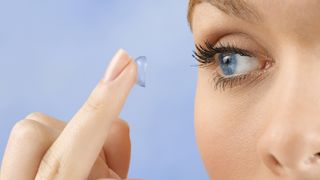Over 45 million Americans wear this form of corrective eyewear, and with retailers of the best contact lenses online (opens in new tab) constantly driving prices down, they’re cheap to get hold of too. With one in three Americans admitting to napping or sleeping in contacts, according to a CDC report, this is a common conundrum. But surely there’s a difference between daily (disposable) contacts that aren’t safe to sleep in and extended wear contacts? Well yes, but opinion is still divided over whether it’s safe to sleep in any type of lenses, period. In 2018 the CDC published a report (opens in new tab) highlighting six cases where people suffered corneal infections associated with sleeping with their contacts in. Symptoms ranged from irritation to blurred vision and even vision loss. It’s grim reading, but there are limitations to the report, including its small sample size. Look, contact lenses are a game-changer for tens of millions of Americans and are preferable to even the best eyeglasses online (opens in new tab) in certain situations (hello, sports), but you need to put hygiene first when using them. That includes getting straight on whether or not you can sleep with contacts in. So, let’s see what the experts say…
Can you sleep with contacts in?
Disposable or daily contacts are designed to be discarded after a day’s use, so it’s simply not safe to leave them in when you sleep at night. Extended wear lenses are different though, which is where confusion creeps in. The CDC’s official advice (opens in new tab) is that, whatever type of contacts you wear, you should, ‘follow your eye care professional’s recommendations for contact lens use, including use during sleep.’ The health organization goes on to state that, ‘Although some contact lenses are approved by FDA for overnight wear, the increased risk for infection is acknowledged by their classification as a Class 3 medical device, which includes medical devices with the greatest risk for harm.’ Extended wear contacts are the ones people often sleep in, but if you don’t take them out regularly and pop them in contact solution, bacteria could build up between your eyes and the lenses. That could lead to irritation, infections and more. Speaking to CBS News (opens in new tab), Dr Christopher Starr, an ophthalmologist at Weill Cornell Medical Center in New York, explained: “When you sleep in contact lenses, oxygen permeation goes down. Bacteria like dark, damp places with no oxygen and no movement. When you blink throughout the day, you’re essentially cleaning your contact lenses, and when you sleep and are not blinking, the bacteria can grow and infect the cornea.’
Can you nap with contacts in, or is that the same deal as with sleep?
Generally speaking, the longer you spend asleep in your contacts, the greater your risk of inflammation or infection. These issues are less likely with short naps, but they can still happen. When chatting to PopSugar, Ophthalmologist and San Francisco Eye Institute founder, Margaret Liu, MD, explained (opens in new tab) that, ‘If you’re asleep for one or more hours, your contact lenses can dry up in your eyes. This can cause discomfort or even scratch your eyes when you open them.’ If you do fall asleep with your contacts in and your eyes feel dry, itchy or look sore upon waking, take out your contact lenses and put them in contact solution. Then, hydrate your eyes with some good quality eye drops to restore moisture. If you notice signs of infection, or you’re experiencing blurred vision, call your optometrist or doctor as soon as possible to treat any potential problem.
What’s the issue with bacteria and contact lenses anyway?
Eyes come into contact with bacteria daily, yet infections are rare and that’s in part thanks to our corneas. When healthy (hydrated and oxygenated), corneas help protect eyes against bacteria and other contaminants. Blinking is the most obvious way to keep them moist. As contacts sit directly over the eye, they reduce the level of moisture and oxygen your eyes have access to. When you sleep with contacts in, it reduces further. So unless expressly directed otherwise by your eye care specialist, it’s good practice to remove your contacts each night before hitting the hay. This gives your lenses a chance to sit in a cleansing solution overnight, lowering the risk of bacteria build-up, and it enables your eyes to access more of the moisture and oxygen they need to stay healthy. Experts at the Swagel Wootton Eye Institute, Australia, warn (opens in new tab) that ignoring the lens manufacturer’s safety guidelines is a big no-no. ‘Even if you follow hygienic best practice with your lenses by rinsing them regularly, over-wearing can cause complications with your sight. This is because protein deposits, microorganisms and allergens build up on your lenses over time – no matter how well you clean them.’ This build-up can result in an array of issues, including a burning sensation when you pop your lenses in. Ouch! The American Optometric Association also advises (opens in new tab) people to never, ‘sleep in contact lenses after being exposed to pools, lakes, oceans, hot tubs or other sources of water that can contain bacteria.’ Again, if bacteria builds up between the lenses and your eye, you could be looking at an infection requiring medical treatment. Speaking of which, if you don’t have coverage, read our best vision care (opens in new tab) guide to see how it could benefit you. Looking for contact lenses? These are the places to head to for disposables, prescription lenses and more:
1800 Contacts (opens in new tab)AC Lenses (opens in new tab)Glasses USA (opens in new tab)Discount Contact Lenses (opens in new tab)
